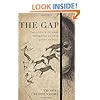 Earlier we noted that the “We share 99% of our DNA with chimps” claim rises again” (Like Dracula it can’t really die, as it is culturally needed. So it just keeps rising from the grave. Evidence is irrelevant.*)
Earlier we noted that the “We share 99% of our DNA with chimps” claim rises again” (Like Dracula it can’t really die, as it is culturally needed. So it just keeps rising from the grave. Evidence is irrelevant.*)
In a paywalled article in Trends in Ecology & Evolution, Henry Gee reviews Thomas Suddendorf’s The Gap:
Suddendorf’s task is to get into the minds of apes to get a more precise idea of what it is that separates us from the other apes. He concludes that the difference springs from six interdependent facilities, some of which are present in some degree in other creatures but which, in humans, reinforce one another, bootstrapping us from the mud and into the firmament. These facilities are language, foresight (‘mental time travel’), mind reading (the ability to see the world from someone else’s viewpoint), intelligence, culture, and morality. Suddendorf looks at all of these in detail, charting how they develop in children and noting the limitations in all of these spheres of other animals, mainly apes.
Gee goes on to suggest that it might be fruitful to study the minds of animals not believed to be remotely related to humans, such as crows and octopuses. That seems like a good idea, because it might help us determine more clearly what we mean by “intelligence” in animals.
See also: Matching Darwin’s “Tree of Life,” the “Tree of Intelligence” comes crashing down”
The eggheads: Have bird brains scrambled Darwin’s tree of life?
and Sublime Mold
There exists an undeniable chasm between the capacities of humans and those of animals. Our minds have spawned civilizations and technologies that have changed the face of the Earth, whereas even our closest animal relatives sit unobtrusively in their dwindling habitats. Yet despite longstanding debates, the nature of this apparent gap has remained unclear. What exactly is the difference between our minds and theirs?
In The Gap, psychologist Thomas Suddendorf provides a definitive account of the mental qualities that separate humans from other animals, as well as how these differences arose. Drawing on two decades of research on apes, children, and human evolution, he surveys the abilities most often cited as uniquely human—language, intelligence, morality, culture, theory of mind, and mental time travel—and finds that two traits account for most of the ways in which our minds appear so distinct: Namely, our open-ended ability to imagine and reflect on scenarios, and our insatiable drive to link our minds together. These two traits explain how our species was able to amplify qualities that we inherited in parallel with our animal counterparts; transforming animal communication into language, memory into mental time travel, sociality into mind reading, problem solving into abstract reasoning, traditions into culture, and empathy into morality. More.
* It’s not good for the importance of the gene in creating the “form” of a life form if that is true. Of course, it all depends on what one wishes to count, but much lower figures are more responsibly offered.
Follow UD News at Twitter!